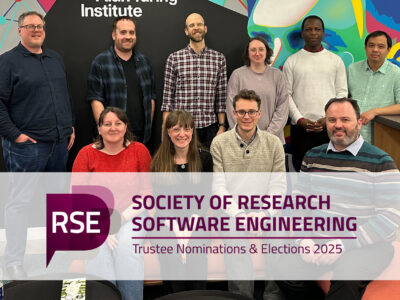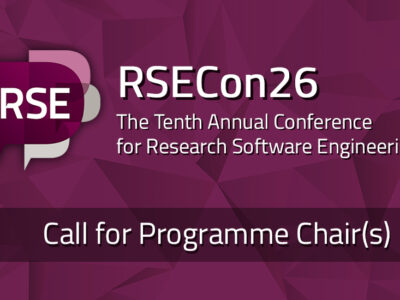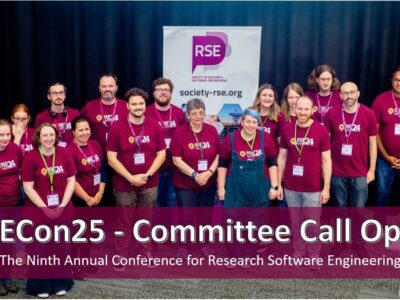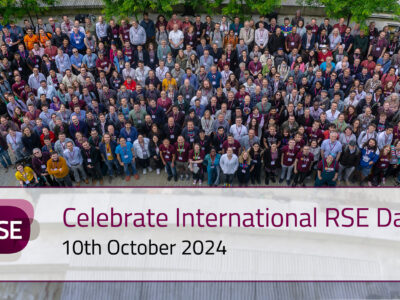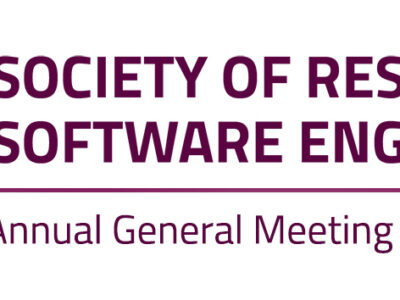Trustee Elections 2024 – FAQs
The 2024 Society Trustee elections are well underway, with nominations still open until Friday 12th July.
- For more information about the election, check out this blog post.
- For Mike’s perspective on what it is like to be a current trustee, check out this blog post.

We have hosted two Zoom Q&A sessions, have fielded questions via the #elections-2024 Slack channel and Social media, and have been talking to RSEs in our teams up and down the country. In this blog post update, with a few days to go until the nominations close, I wanted to try to answer some of the questions that we have been asked.
Available Roles
We were asked about the roles that are stepping down, and whether there are specific roles on the board that need to be filled.
The president and treasurer are stepping down this year. The current vice president/treasurer is generally expected to step up to take on that role next year, but that doesn’t necessarily stop you from applying. There will be a vote to appoint these positions.
All other roles are basically up for grabs. Once the trustees are elected, we nominate ourselves for various roles, and then the roles are assigned at the first meeting. We generally ask people to put their names forward to be chair of one team and members of a different team, but you can take on other roles (with a view to moving into more senior roles in the future), depending on your workload. Enthusiasm is often more important than experience, and while most of the current trustees are staying on, I suspect that many of us will be willing to take on different roles from the ones we’re currently performing.
So, no, there are no specific roles that we are recruiting for this year. The roles are assigned after the election.
The Voting Process
We also had a question about the voting process. There will be five vacancies (unfortunately, we aren’t allowed to have more than 14 trustees). When nominations close, what happens next will depend on how many people nominate themselves:
- If five or fewer people apply, then those applicants will be elected, pending a ratifying vote at the AGM to confirm it.
- If more than five people apply, then there will be a competitive election. Your responses to the key questions on the application form will be published, and all registered society members will be able to vote. The vote is conducted in the run-up to RSECon by independent scrutineers, and the candidates with the most votes will be announced at the AGM.
Do you enjoy it?
Someone asked: “Do/did you actually enjoy being Trustees?”
This is a very good question! Of course, we’re trying to be honest and transparent in order to set realistic expectations for the level of work and responsibilities involved (though we may have gone too far!). But the response from all of the trustees present was “yes”. We love the job, it’s a nice bunch of people, and we feel supported and empowered to do the work we need to do. It’s a wonderful opportunity to get to know other members of the community and gain skills and experience that may help you in your career. But yes, it is also a fun and rewarding experience!
How competitive is it?
It varies. There are only five roles available this year, and as described above, there will be a competitive election if more than five people apply. Talking to fellow trustees, over the last four years, I believe there have been two elections. In the other years, there were fewer volunteers than vacancies, so they were all successful. When there have been elections, there are usually only a few more applicants than places – last year, there were 8 applicants for 7 spaces. I don’t think we’ve ever had double the number of applicants, so your odds are better than 1 in 2! (I can’t rule out the possibility that dozens of people will apply this year, but the consensus is that it’s unlikely!)
How are roles assigned?
I touched on this above, but once elected, people can put their name forward for any of the roles, teams and working groups, and then we decide amongst ourselves. Certain positions (like President) need to be voted in. It is also possible to share roles, so I am co-chair of the Events team and the Comms team. Again, we recommend each trustee take on the leadership of one team and be a member of another, but it’s flexible and we try to take everyone’s preferences into account.
How long do trustees serve for?
It’s up to you, but each trustee can serve for a term of up to three years. At the end of that term, you can stand for re-election (there is a limit to the number of terms you can serve). In reality, it feels like most people do two or three years and then stand down. Others have stood down after one year, so it’s up to you. For continuity and the passing on of institutional knowledge, it’s better not to have too much turnover, but fresh input is also important. And obviously, if your circumstances change then that can be taken into account.
Will it cost my institution anything?
Not in terms of cold, hard cash! Obviously, it would be great if your line manager is willing to give you time to work on your trustee duties. But any financial costs that you incur will be covered by the Society. For example, if you have to travel to an event to represent the Society, or if we were to hold an in-person meeting, then we will pay for your travel, accommodation etc.
Tips for Applying?
This is a tricky one! It’s hard to say how the membership will vote. But I think there are two things that I think you can do to make your application as strong as possible:
- Be active in the community. If you have already made a name for yourself (perhaps by joining one of our Working Groups – which are open to non-trustees) or by getting involved on the conference committee, for example, then being able to say so on your application should help your case. Taking on these roles is also a good way of dipping your toe in and making sure that it’s something you want to do and that you can fit it in around your day job – if that is something you are concerned about.
- Tell a good story. Tell people why you want to be a trustee. What do you bring to the role? Let your enthusiasm shine through! In the event of an election, the information you provide on the application form will be what people use to decide why they should vote for you. Take some time to make your application as compelling as possible.
Final Thoughts
Hopefully, that answers some of your questions. For more information, check out the blog posts linked at the top of this article. If you have any more questions, the best place to get in touch with us is via the #elections-2024 channel on Slack.
The Elections Working Group for 2024 is: Mike Simpson (chair), David Beavan, Evelina Gabasova, and Twin Karmakharm.


